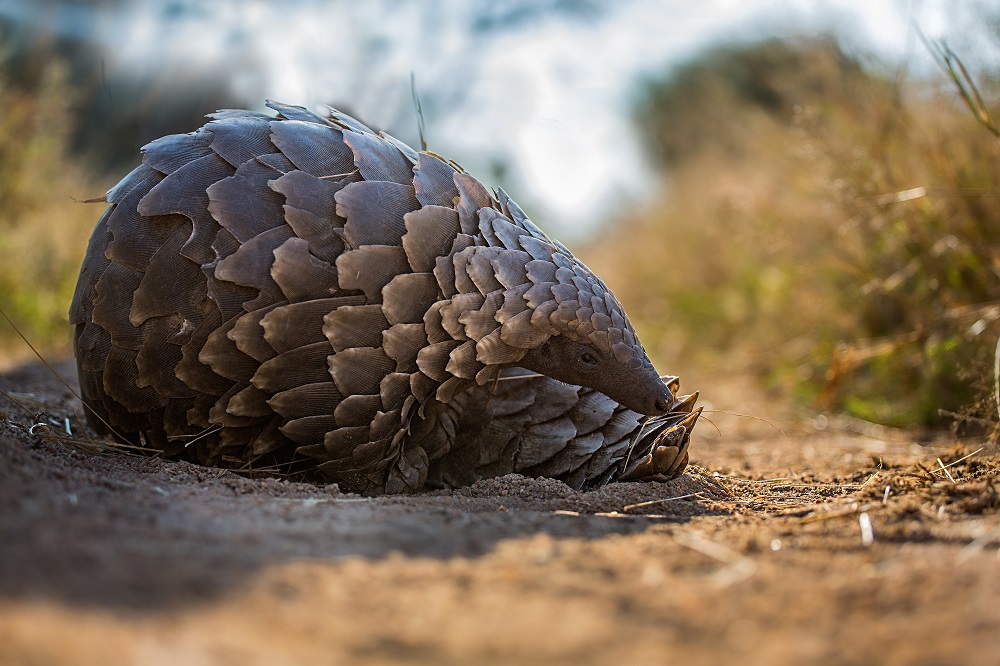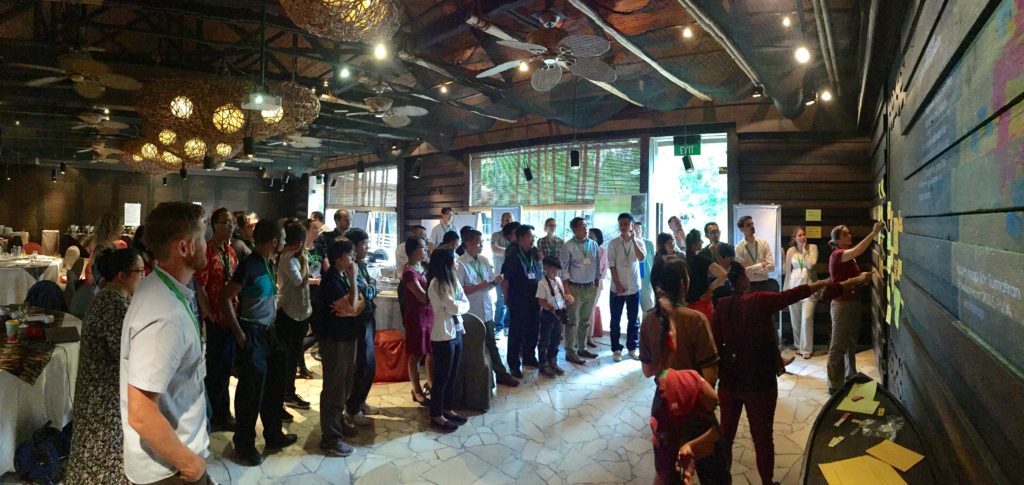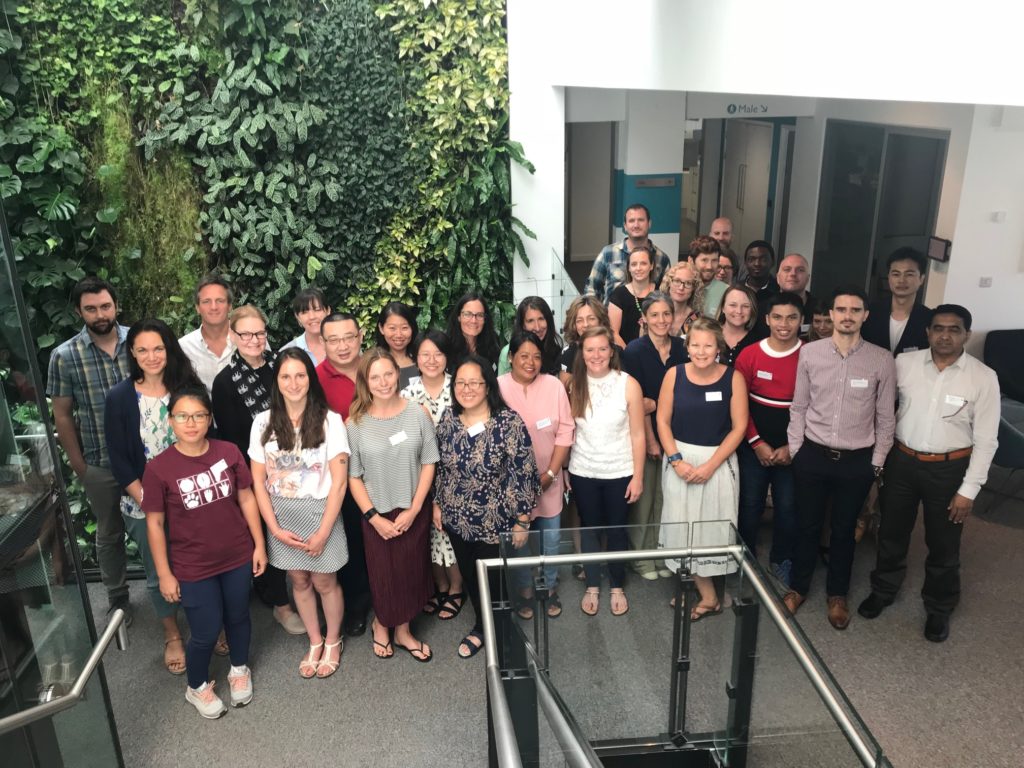World Pangolin Day is a yearly global celebration of pangolins and the people working to save them from extinction. For the Pangolin Specialist Group (PSG), World Pangolin Day has become a natural moment each year to reflect on our progress and think about next steps. We celebrate our “birthday” at this time each year, and we’re happy to count 2019 as the 7th anniversary of our members joining forces under the auspices of the IUCN Species Survival Commission to catalyze critical conservation actions for pangolins.
 Temminck’s Ground Pangolin (Smutsia temminckii). Photo credit Keith Connelly.
Temminck’s Ground Pangolin (Smutsia temminckii). Photo credit Keith Connelly.
It’s inspiring to see what members have accomplished under the banner of our group since our re-formation in 2012. We identified conservation priorities for pangolins in our call to action, Scaling Up Pangolin Conservation, in 2013. We updated the IUCN Red List Assessments for the eight pangolin species in 2014 and are preparing another, soon-to-be-published update. We contributed scientific and technical expertise to the Convention on International Trade in Endangered Species of Wild Fauna and Flora (CITES). And importantly, our membership has grown to now include more than 120 pangolin experts from 35 countries.
As we begin our 8th year, despite our progress the story of pangolins continues to be grim. Faced with headlines of record-setting confiscations of pangolins, the importance of our shared efforts and our determination to change the story for pangolins only grows.
Developing a Global Consolidated Strategy for Pangolin Conservation
We recently turned our attention to another ambitious goal: developing detailed, regional strategies for each of the eight pangolin species, which can be bolstered by the development of national action plans. Our method for this endeavor is the One Plan Approach, wherein species management plans are developed jointly by all responsible parties to produce a single, comprehensive plan for a species, with the ultimate goal of supporting its conservation in the wild. Developed by the IUCN SSC Conservation Planning Specialist Group (CPSG) and detailed in the IUCN Guidelines for Species Conservation Planning, this integrated approach to species conservation planning incorporates participation from all responsible parties and a broad range of diverse stakeholders. The One Plan Approach helps bridge the gap between wild and captive population management.
Face-to-face engagement, such as through a facilitated multi-stakeholder workshop, is recommended to support this process. While the costs of bringing together international stakeholders in person may seem prohibitive, the benefits outweigh the initial investment as face-to-face engagement demonstrably facilitates the development of effective, long term collaboration.
 Group brainstorming at the Sunda Pangolin Regional Conservation Planning Workshop. Photo credit Keri Parker.
Group brainstorming at the Sunda Pangolin Regional Conservation Planning Workshop. Photo credit Keri Parker.
Our members in East and Southeast Asia are leading this charge for integrated pangolin conservation planning.
- In June 2017, Wildlife Reserves Singapore hosted a multi-stakeholder workshop facilitated by the CPSG to create the first regional strategy to conserve the Critically Endangered Sunda pangolin (Manis javanica), which will be published imminently.
- In Taipei in December 2017, again with facilitation support from the CPSG, a Population and Habitat Viability Assessment (PHVA) was completed for the nominal subspecies of Chinese pangolin that occurs on Taiwan, Manis pentadactyla pentadactyla. The PHVA workshop was hosted by Taipei Zoo and organized in collaboration with the Taiwan Forest Bureau and the Endemic Species Research Institute.
- And, in April 2018, our members convened a workshop on Palawan to develop a national conservation strategy for the endemic Philippine pangolin (Manis culionensis) in collaboration with the Palawan Council for Sustainable Development Staff (PCSDS), Katala Foundation Incorporated (KFI), and Zoological Society of London (ZSL).
Looking ahead, a top priority for PSG leadership in 2019 will be to examine opportunities to convene additional multi-stakeholder workshops with facilitation support from the CPSG to develop regional conservation plans for other pangolin species and inspire subsequent national planning workshops. We intend that regional and national plans will together inform one consolidated global strategy for pangolin conservation.
Face-to-Face Engagement Strengthens Collaboration
 Participants at the 2018 workshop to develop ecological monitoring methods for pangolins in Cambridge, England.
Participants at the 2018 workshop to develop ecological monitoring methods for pangolins in Cambridge, England.
Given the threats facing pangolins, opportunities for our members to come together face-to-face to share information and develop progressive strategies to combat pangolin trafficking matter more than ever. Multi-stakeholder workshops provide an important opportunity for participants to share scarce, not-yet-published information and brainstorm novel, shared insights. This inspired our August 2018 workshop to develop ecological monitoring methods for pangolins. Held in Cambridge, England and funded with a grant from the U.S. Fish and Wildlife Service, the workshop brought together experts in population ecology, statistical modelling, and wildlife research with a group of pangolin field researchers from 16 pangolin range states in Africa and Asia to share expertise. The workshop allowed experts to share scarce information and identify best-practice techniques for detecting and monitoring pangolins in order to develop estimates of how many pangolins might remain in the wild, and consider how to improve conservation programs going forward.
Priorities for CITES CoP18
Developing ecological monitoring methods for pangolins is one of several critical priorities for governments that will come together in May for the 18th CITES Conference of the Parties (CoP). Taking place in Colombo, Sri Lanka, the CoP is of interest to PSG members not only because Sri Lanka is home to a population of Indian pangolins (Manis crassicaudata), but as a platform to discuss several important agenda items with CITES Parties. PSG members will convene a side event at the CoP to introduce and explain outcomes of the ecological monitoring methods workshop, which will be provided in an information document to the meeting. Additionally, agenda item #75 highlights opportunities for governments to support the PSG’s work to develop a pangolin trade resource kit. The kit would support CITES authorities with:
- identification materials for pangolins and their derivatives in illegal trade;
- standardized protocols for sampling seizures of large volumes of pangolin scales;
- practice protocols for safe handling, care and rehabilitation;
- guidance on the immediate and long-term placement of live animals; and,
- a catalogue of suitable housing facilities for trade-confiscated pangolins.
Take Time to Celebrate Pangolins
In our seven years together we have made real progress for pangolins. Yet, as we develop conservation plans for pangolins and resources to support effective implementation of CITES, in many ways our work has just begun. As we work together to achieve our goals, it’s important to also remember to have a little fun. World Pangolin Day is the perfect occasion. You can join our effort to save pangolins this World Pangolin Day, and every day, by spreading the word about these fascinating animals and celebrating what makes them unique. We encourage you to host pangolin-themed events, create ant-candy cupcakes and pangolin-inspired crafts, spread the word about pangolins through social media (#WorldPangolinDay), and even build pangolins out of snow.
We need everyone’s help to change the story of pangolins, and we want to hear from you. Take time to celebrate pangolins, share your World Pangolin Day stories with us, and be sure to join us on social media (@PangolinSG) throughout the year.
Keri Parker
Vice Chair, IUCN SSC Pangolin Specialist Group
Co-Founder, Save Pangolins

